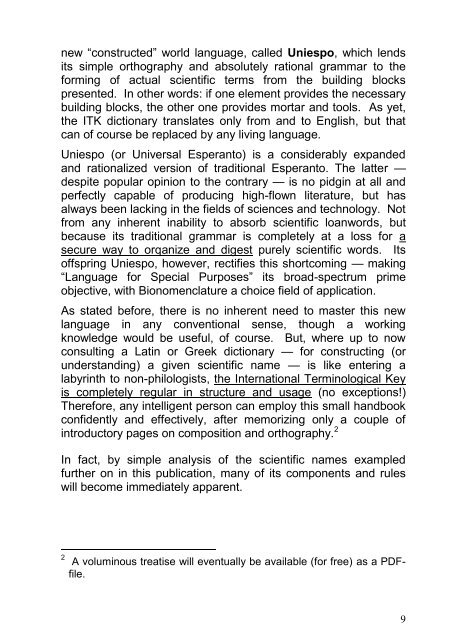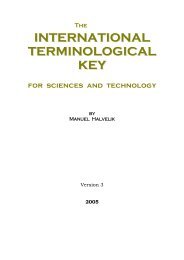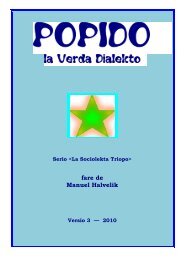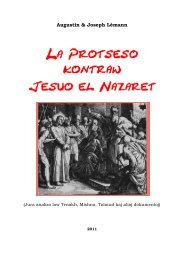the TRIMERAL SYSTEM in BIOLOGICAL TAXONOMY - universala ...
the TRIMERAL SYSTEM in BIOLOGICAL TAXONOMY - universala ...
the TRIMERAL SYSTEM in BIOLOGICAL TAXONOMY - universala ...
Create successful ePaper yourself
Turn your PDF publications into a flip-book with our unique Google optimized e-Paper software.
new “constructed” world language, called Uniespo, which lends<br />
its simple orthography and absolutely rational grammar to <strong>the</strong><br />
form<strong>in</strong>g of actual scientific terms from <strong>the</strong> build<strong>in</strong>g blocks<br />
presented. In o<strong>the</strong>r words: if one element provides <strong>the</strong> necessary<br />
build<strong>in</strong>g blocks, <strong>the</strong> o<strong>the</strong>r one provides mortar and tools. As yet,<br />
<strong>the</strong> ITK dictionary translates only from and to English, but that<br />
can of course be replaced by any liv<strong>in</strong>g language.<br />
Uniespo (or Universal Esperanto) is a considerably expanded<br />
and rationalized version of traditional Esperanto. The latter —<br />
despite popular op<strong>in</strong>ion to <strong>the</strong> contrary — is no pidg<strong>in</strong> at all and<br />
perfectly capable of produc<strong>in</strong>g high-flown literature, but has<br />
always been lack<strong>in</strong>g <strong>in</strong> <strong>the</strong> fields of sciences and technology. Not<br />
from any <strong>in</strong>herent <strong>in</strong>ability to absorb scientific loanwords, but<br />
because its traditional grammar is completely at a loss for a<br />
secure way to orqanize and digest purely scientific words. Its<br />
offspr<strong>in</strong>g Uniespo, however, rectifies this shortcom<strong>in</strong>g — mak<strong>in</strong>g<br />
“Language for Special Purposes” its broad-spectrum prime<br />
objective, with Bionomenclature a choice field of application.<br />
As stated before, <strong>the</strong>re is no <strong>in</strong>herent need to master this new<br />
language <strong>in</strong> any conventional sense, though a work<strong>in</strong>g<br />
knowledge would be useful, of course. But, where up to now<br />
consult<strong>in</strong>g a Lat<strong>in</strong> or Greek dictionary — for construct<strong>in</strong>g (or<br />
understand<strong>in</strong>g) a given scientific name — is like enter<strong>in</strong>g a<br />
labyr<strong>in</strong>th to non-philologists, <strong>the</strong> International Term<strong>in</strong>ological Key<br />
is completely regular <strong>in</strong> structure and usage (no exceptions!)<br />
Therefore, any <strong>in</strong>telligent person can employ this small handbook<br />
confidently and effectively, after memoriz<strong>in</strong>g only a couple of<br />
<strong>in</strong>troductory pages on composition and orthography. 2<br />
In fact, by simple analysis of <strong>the</strong> scientific names exampled<br />
fur<strong>the</strong>r on <strong>in</strong> this publication, many of its components and rules<br />
will become immediately apparent.<br />
2<br />
A volum<strong>in</strong>ous treatise will eventually be available (for free) as a PDFfile.<br />
9






